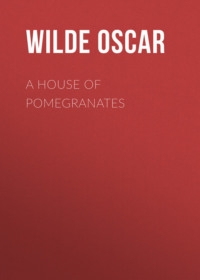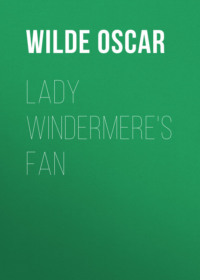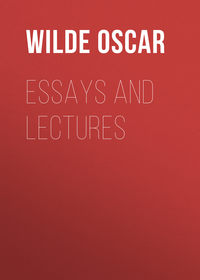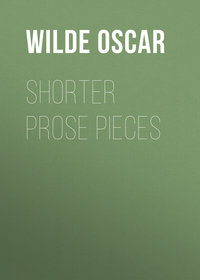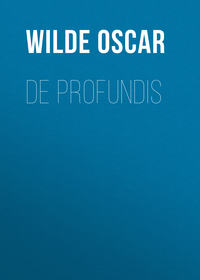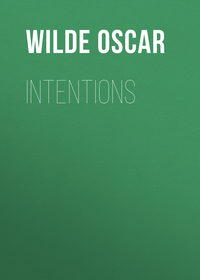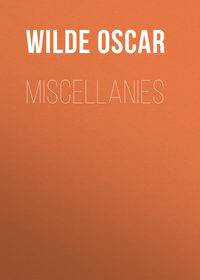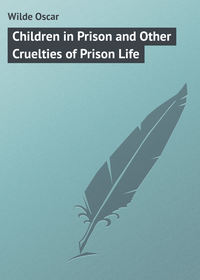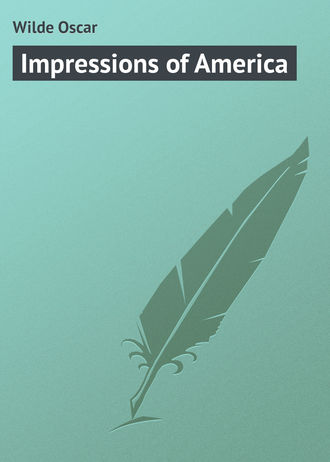 полная версия
полная версияImpressions of America

Oscar Wilde
Impressions of America
IMPRESSIONS
ILE JARDINThe lily’s withered chalice fallsAround its rod of dusty gold,And from the beech trees on the woldThe last wood-pigeon coos and calls.The gaudy leonine sunflowerHangs black and barren on its stalk,And down the windy garden walkThe dead leaves scatter, – hour by hour.Pale privet-petals white as milkAre blown into a snowy mass;The roses lie upon the grass,Like little shreds of crimson silk.IILA MERA white mist drifts across the shrouds,A wild moon in this wintry skyGleams like an angry lion’s eyeOut of a mane of tawny clouds.The muffled steersman at the wheelIs but a shadow in the gloom; —And in the throbbing engine roomLeap the long rods of polished steel.The shattered storm has left its traceUpon this huge and heaving dome,For the thin threads of yellow foamFloat on the waves like ravelled lace.Oscar Wilde.PREFACE
Oscar Wilde visited America in the year 1882. Interest in the Æsthetic School, of which he was already the acknowledged master, had sometime previously spread to the United States, and it is said that the production of the Gilbert and Sullivan opera, “Patience,”1 in which he and his disciples were held up to ridicule, determined him to pay a visit to the States to give some lectures explaining what he meant by Æstheticism, hoping thereby to interest, and possibly to instruct and elevate our transatlantic cousins.
He set sail on board the “Arizona” on Saturday, December 24th, 1881, arriving in New York early in the following year. On landing he was bombarded by journalists eager to interview the distinguished stranger. “Punch,” in its issue of January 14th, in a happy vein, parodied these interviewers, the most amusing passage in which referred to “His Glorious Past,” wherein Wilde was made to say, “Precisely – I took the Newdigate. Oh! no doubt, every year some man gets the Newdigate; but not every year does Newdigate get an Oscar.”
At Omaha, where, under the auspices of the Social Art Club, Wilde delivered a lecture on “Decorative Art,” he described his impressions of many American houses as being “illy designed, decorated shabbily, and in bad taste, filled with furniture that was not honestly made, and was out of character.” This statement gave rise to the following verses: —
What a shame and what a pity,In the streets ofLondon CityMr. Wilde is seen no more.Far fromPiccadilly banished,He toOmaha has vanished.Horrid place, which swells ignore.On his back a coat he beareth,Such asSir JohnBennet weareth,Made of velvet – strange array!Legs Apollo might have sighed for,Or greatHercules have died for,His knee breeches now display.Waving sunflower and lily,He calls all the houses “illyDecorated and designed.”For of taste they’ve not a tittle;They may chew and they may whittle;But they’re all born colour-blind!His lectures dealt almost exclusively with the subjects of Art and Dress Reform. In the course of one lecture he remarked that the most impressive room he had yet entered in America was the one in Camden Town where he met Walt Whitman. It contained plenty of fresh air and sunlight. On the table was a simple cruse of water. This led to a parody, in the style of Whitman, describing an imaginary interview between the two poets, which appeared in “The Century” a few months later. Wilde is called Narcissus and Whitman Paumanokides.
Paumanokides: —Who may this be?This young man clad unusually with loose locks, languorous, glidingly toward me advancing,Toward the ceiling of my chamber his orbic and expressive eyeballs uprolling,and so on, to which Narcissus replies,
O clarion, from whose brazen throat,Strange sounds across the seas are blown,Where England, girt as with a moat,A strong sea-lion sits alone!Of the lectures which he delivered in America only one has been preserved, namely that on the English Renaissance. This was his first lecture, and it was delivered in New York on January 9th, 1882. According to a contemporary account in the “New York Herald” a distinguished and crowded audience assembled in Chickering Hall that evening to listen to one who “was well worth seeing, his short breeches and silk stockings showing to even better advantage upon the stage than in the gilded drawing-rooms, where the young Apostle has heretofore been seen in New York.”2
On leaving the States in the “fall” of the year Wilde proceeded to Canada and thence to Nova Scotia, arriving in Halifax in the second week of October. Of his visit there we have no record except an amusing interview described in a local paper a few days later. He was dressed in a velvet jacket with an ordinary linen collar and neck tie and he wore trousers. “Mr. Wilde,” the interviewer states, “was communicative and genial; he said he found Canada pleasant, but in answer to a question as to whether European or American women were the more beautiful, he dexterously evaded his querist.”
As regards poetry he expressed his opinion that Poe was the greatest American poet, and that Walt Whitman, if not a poet, was a man who sounded a strong note, perhaps neither prose nor poetry, but something of his own that was “grand, original and unique.”
During his tour in America Wilde “happened to find” himself (as he has himself described it), in Louisville, Kentucky. The subject he had selected to speak on was the Mission of Art in the Nineteenth Century. In the course of his lecture he had occasion to quote Keats’ Sonnet on Blue “as an example of the poet’s delicate sense of colour-harmonies.” After the lecture there came round to see him “a lady of middle age, with a sweet gentle manner and most musical voice,” who introduced herself as Mrs. Speed, the daughter of George Keats, and she invited the lecturer to come and examine the Keats manuscripts in her possession.
Some months afterwards when lecturing in California he received a letter from this lady asking him to accept the original manuscript of the sonnet which he had quoted.
Mention must be made of Wilde’s first play, a drama in blank verse entitled “Vera, or the Nihilists.” It had been arranged that, before his departure for America, this play should be performed at the Adelphi Theatre, London, with Mrs. Bernard Beere as the heroine, on Saturday, December 17th, 1881, but a few weeks before the date fixed for the first performance, the author decided to postpone the production “owing to the state of political feeling in England.”
On his return to England in 1883 Wilde started on a lecturing tour, the first being to the Art Students of the Royal Academy at their Club in Golden Square on June 30th. Ten days later he spoke at Prince’s Hall on his “Personal Impressions of America,” and on subsequent occasions at Margate, Ramsgate and Southampton. On Monday, July 30th he lectured at Southport and on the following Thursday he went to Liverpool to welcome Mrs. Langtry on her return from America, and the same afternoon he left on his second visit to the States in order to superintend the rehearsals of “Vera,” which it had been arranged to produce at the Union Square Theatre, New York, on August 20th following. The piece was not a success – it was, indeed, the only failure Wilde had. However, his next play, which he called his “Opus Secundum,” also a blank verse tragedy, had a successful run in America in 1891. This was “The Duchess of Padua,” played by Lawrence Barrett, under the title of “Guido Ferranti.” This has not been seen in England, nor is it even possible for Wilde’s admirers to read this early offspring of his pen, for only twenty copies were printed for acting purposes in America and of these but one is known to be in existence, in this country at least.
An authorised German translation was made by Max Meyerfeld and the first performance took place at the German Theatre in Hamburg about a year ago. An English version is advertised from a piratical publisher in Paris but it is only a translation from the German back into English.
Towards the end of September 1883 Oscar Wilde returned to England and immediately began “an all round lecturing tour,” his first visit being to Wandsworth Town Hall on Monday, September 24th, when he delivered to an enthusiastic audience a lecture on his “Impressions of America,” which is contained in the following pages. He was dressed, a London paper of the time states, “in ordinary evening costume, and carried an orange-coloured silk handkerchief in his breast. He spoke with great fluency, in a voice now and then singularly musical, and only once or twice made a scarcely perceptible reference to notes.” The lecture was under the auspices of a local Literary Society, and the principle residents of the district turned out “en masse.” The Chairman, the Rev. John Park, in introducing the lecturer, said there were two reasons why he was glad to welcome him, and he thought his own feelings would be shared by the audience. They must all plead guilty to a feeling of curiosity, he hoped a laudable one, to see and hear Mr. Wilde for his own sake, and they were also glad to hear about America – a country which many might regard as a kind of Elysium.
On March 5th in the following year Wilde lectured at the Crystal Palace on his American experiences, and on April 26th he “preached his Gospel in the East-end,” when it is recorded that his audience was not only delighted with his humour, but was “surprised at the excellent good sense he talked.” His subject was a plea in favour of “art for schools,” and many of his remarks about the English system of elementary education – with its insistence on “the population of places that no one ever wants to go to,” and its “familiarity with the lives of persons who probably never existed” – were said to be quite worthy of Ruskin. A contemporary account adds that Wilde “showed himself a pupil of Mr. Ruskin’s, too, in insisting on the importance of every child being taught some handicraft, and in looking forward to the time when a boy would rather look at a bird or even draw it than throw “his customary stone!”
The British “gamin” has not made much progress in this respect during the last twenty years!
His lectures on “Dress,” with the newspaper correspondence which they evoked, including some of Oscar Wilde’s replies in his most characteristic vein, must be reserved for a future volume.
STUART MASON.Oxford, January 1906.IMPRESSIONS OF AMERICA
I fear I cannot picture America as altogether an Elysium – perhaps, from the ordinary standpoint I know but little about the country. I cannot give its latitude or longitude; I cannot compute the value of its dry goods, and I have no very close acquaintance with its politics. These are matters which may not interest you, and they certainly are not interesting to me.
The first thing that struck me on landing in America was that if the Americans are not the most well-dressed people in the world, they are the most comfortably dressed. Men are seen there with the dreadful chimney-pot hat, but there are very few hatless men; men wear the shocking swallow-tail coat, but few are to be seen with no coat at all. There is an air of comfort in the appearance of the people which is a marked contrast to that seen in this country, where, too often, people are seen in close contact with rags.
The next thing particularly noticeable is that everybody seems in a hurry to catch a train. This is a state of things which is not favourable to poetry or romance. Had Romeo or Juliet been in a constant state of anxiety about trains, or had their minds been agitated by the question of return-tickets, Shakespeare could not have given us those lovely balcony scenes which are so full of poetry and pathos.
America is the noisiest country that ever existed. One is waked up in the morning, not by the singing of the nightingale, but by the steam whistle. It is surprising that the sound practical sense of the Americans does not reduce this intolerable noise. All Art depends upon exquisite and delicate sensibility, and such continual turmoil must ultimately be destructive of the musical faculty.
There is not so much beauty to be found in American cities as in Oxford, Cambridge, Salisbury or Winchester, where are lovely relics of a beautiful age; but still there is a good deal of beauty to be seen in them now and then, but only where the American has not attempted to create it. Where the Americans have attempted to produce beauty they have signally failed. A remarkable characteristic of the Americans is the manner in which they have applied science to modern life.
This is apparent in the most cursory stroll through New York. In England an inventor is regarded almost as a crazy man, and in too many instances invention ends in disappointment and poverty. In America an inventor is honoured, help is forthcoming, and the exercise of ingenuity, the application of science to the work of man, is there the shortest road to wealth. There is no country in the world where machinery is so lovely as in America.
I have always wished to believe that the line of strength and the line of beauty are one. That wish was realised when I contemplated American machinery. It was not until I had seen the water-works at Chicago that I realised the wonders of machinery; the rise and fall of the steel rods, the symmetrical motion of the great wheels is the most beautifully rhythmic thing I have ever seen.3 One is impressed in America, but not favourably impressed, by the inordinate size of everything. The country seems to try to bully one into a belief in its power by its impressive bigness.
I was disappointed with Niagara – most people must be disappointed with Niagara. Every American bride is taken there, and the sight of the stupendous waterfall must be one of the earliest, if not the keenest, disappointments in American married life. One sees it under bad conditions, very far away, the point of view not showing the splendour of the water. To appreciate it really one has to see it from underneath the fall, and to do that it is necessary to be dressed in a yellow oil-skin, which is as ugly as a mackintosh – and I hope none of you ever wears one. It is a consolation to know, however, that such an artist as Madame Bernhardt has not only worn that yellow, ugly dress, but has been photographed in it.
Perhaps the most beautiful part of America is the West, to reach which, however, involves a journey by rail of six days, racing along tied to an ugly tin-kettle of a steam engine. I found but poor consolation for this journey in the fact that the boys who infest the cars and sell everything that one can eat – or should not eat – were selling editions of my poems vilely printed on a kind of grey blotting paper, for the low price of ten cents.4 Calling these boys on one side I told them that though poets like to be popular they desire to be paid, and selling editions of my poems without giving me a profit is dealing a blow at literature which must have a disastrous effect on poetical aspirants. The invariable reply that they made was that they themselves made a profit out of the transaction and that was all they cared about.
It is a popular superstition that in America a visitor is invariably addressed as “Stranger.” I was never once addressed as “Stranger.” When I went to Texas I was called “Captain”; when I got to the centre of the country I was addressed as “Colonel,” and, on arriving at the borders of Mexico, as “General.” On the whole, however, “Sir,” the old English method of addressing people is the most common.
It is, perhaps, worth while to note that what many people call Americanisms are really old English expressions which have lingered in our colonies while they have been lost in our own country. Many people imagine that the term “I guess,” which is so common in America, is purely an American expression, but it was used by John Locke in his work on “The Understanding,” just as we now use “I think.”5
It is in the colonies, and not in the mother country, that the old life of the country really exists. If one wants to realise what English Puritanism is – not at its worst (when it is very bad), but at its best, and then it is not very good – I do not think one can find much of it in England, but much can be found about Boston and Massachusetts. We have got rid of it. America still preserves it, to be, I hope, a short-lived curiosity.
San Francisco is a really beautiful city. China Town, peopled by Chinese labourers, is the most artistic town I have ever come across. The people – strange, melancholy Orientals, whom many people would call common, and they are certainly very poor – have determined that they will have nothing about them that is not beautiful. In the Chinese restaurant, where these navvies meet to have supper in the evening, I found them drinking tea out of china cups as delicate as the petals of a rose-leaf, whereas at the gaudy hotels I was supplied with a delf cup an inch and a half thick. When the Chinese bill was presented it was made out on rice paper, the account being done in Indian ink as fantastically as if an artist had been etching little birds on a fan.
Salt Lake City contains only two buildings of note, the chief being the Tabernacle, which is in the shape of a soup-kettle. It is decorated by the only native artist, and he has treated religious subjects in the naive spirit of the early Florentine painters, representing people of our own day in the dress of the period side by side with people of Biblical history who are clothed in some romantic costume.
The building next in importance is called the Amelia Palace, in honour of one of Brigham Young’s wives. When he died the present president of the Mormons stood up in the Tabernacle and said that it had been revealed to him that he was to have the Amelia Palace, and that on this subject there were to be no more revelations of any kind!
From Salt Lake City one travels over the great plains of Colorado and up the Rocky Mountains, on the top of which is Leadville, the richest city in the world. It has also got the reputation of being the roughest, and every man carries a revolver. I was told that if I went there they would be sure to shoot me or my travelling manager. I wrote and told them that nothing that they could do to my travelling manager would intimidate me. They are miners – men working in metals, so I lectured to them on the Ethics of Art. I read them passages from the autobiography of Benvenuto Cellini and they seemed much delighted. I was reproved by my hearers for not having brought him with me. I explained that he had been dead for some little time which elicited the enquiry “Who shot him”? They afterwards took me to a dancing saloon where I saw the only rational method of art criticism I have ever come across. Over the piano was printed a notice: —

The mortality among pianists in that place is marvellous. Then they asked me to supper, and having accepted, I had to descend a mine in a rickety bucket in which it was impossible to be graceful. Having got into the heart of the mountain I had supper, the first course being whisky, the second whisky and the third whisky.
I went to the Theatre to lecture and I was informed that just before I went there two men had been seized for committing a murder, and in that theatre they had been brought on to the stage at eight o’clock in the evening, and then and there tried and executed before a crowded audience. But I found these miners very charming and not at all rough.
Among the more elderly inhabitants of the South I found a melancholy tendency to date every event of importance by the late war. “How beautiful the moon is to-night,” I once remarked to a gentleman who was standing next to me. “Yes,” was his reply, “but you should have seen it before the war.”
So infinitesimal did I find the knowledge of Art, west of the Rocky Mountains, that an art patron – one who in his day had been a miner – actually sued the railroad company for damages because the plaster cast of Venus of Milo, which he had imported from Paris, had been delivered minus the arms. And, what is more surprising still, he gained his case and the damages.
Pennsylvania, with its rocky gorges and woodland scenery, reminded me of Switzerland. The prairie reminded me of a piece of blotting-paper.
The Spanish and French have left behind them memorials in the beauty of their names. All the cities that have beautiful names derive them from the Spanish or the French. The English people give intensely ugly names to places. One place had such an ugly name that I refused to lecture there. It was called Grigsville. Supposing I had founded a school of Art there – fancy “Early Grigsville.” Imagine a School of Art teaching “Grigsville Renaissance.”
As for slang I did not hear much of it, though a young lady who had changed her clothes after an afternoon dance did say that “after the heel kick she shifted her day goods.”
American youths are pale and precocious, or sallow and supercilious, but American girls are pretty and charming – little oases of pretty unreasonableness in a vast desert of practical common-sense.
Every American girl is entitled to have twelve young men devoted to her. They remain her slaves and she rules them with charming nonchalance.
The men are entirely given to business; they have, as they say, their brains in front of their heads. They are also exceedingly acceptive of new ideas. Their education is practical. We base the education of children entirely on books, but we must give a child a mind before we can instruct the mind. Children have a natural antipathy to books – handicraft should be the basis of education. Boys and girls should be taught to use their hands to make something, and they would be less apt to destroy and be mischievous.
In going to America one learns that poverty is not a necessary accompaniment to civilisation. There at any rate is a country that has no trappings, no pageants and no gorgeous ceremonies. I saw only two processions – one was the Fire Brigade preceded by the Police, the other was the Police preceded by the Fire Brigade.
Every man when he gets to the age of twenty-one is allowed a vote, and thereby immediately acquires his political education. The Americans are the best politically educated people in the world. It is well worth one’s while to go to a country which can teach us the beauty of the word FREEDOM and the value of the thing LIBERTY.
“And in the throbbing engine roomLeap the long rods of polished steel.”A copy of this edition was sold by auction in New York last year for eight dollars.
A still more striking instance of the use of this expression is to be found in the same writer’s Thoughts concerning Education, s. 28, where he says: – “Once in four and twenty hours, I think, is enough; and nobody, I guess, will think it too much.”
OSCAR WILDE IN AMERICA
An interesting account of Oscar Wilde, at the time of his American tour, was given in the Lady’s Pictorial a few weeks after his arrival in New York, the city which he described as “one huge Whiteley’s shop.”
His Abode.He was interviewed in a room which was intensely warm and the sofa on which the poet reclined was drawn up to the fire. An immense wolf rug, bordered with scarlet, was thrown over it and half-encircled his graceful form in its warm embrace. Wilde was wearied. In a languid, half enervated manner he gently sipped hot chocolate from a cup by his side. Occasionally he inhaled a long, deep whiff from a smouldering cigarette held lightly in his white and shapely hand.
His Dress.He was attired in a smoking suit of dark brown velvet faced with lapels of red quilted silk. The ends of a long dark necktie floated over the facing like sea-weed on foam tinged by the dying sun. Dark brown nether garments, striped with red up the seam, and patent leather shoes with light cloth uppers completed the rest of the poet’s costume.
His favourite colour is said to have been something between brown and green, a tint “that never was on sea or sky,” and he had a complete suit made of it. A white walking-stick which he was in the habit of carrying was presented to him at the Acropolis and was said to have been cut from the olive groves of the Academia. Only in the evening was he wont to don knee breeches, “but evening and morning alike,” adds his interviewer, “find him neither more nor less than a man, and always a perfect gentleman.”


